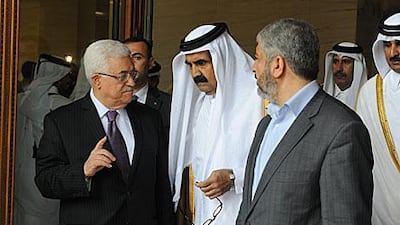JERUSALEM // The main Palestinian political factions, Fatah and Hamas, agreed yesterday to form a unity government led by the Palestinian Authority president, Mahmoud Abbas.
The announcement signalled what Mr Abbas and outgoing Hamas leader Khaled Meshaal hope will end a four-year schism that has seen stalled peace talks with Israel, Palestinian territory in the West Bank and East Jerusalem swallowed by Jewish settlements and no progress on creation of a Palestinian state.
The hiatus has also seen the Palestinians' status as the main embodiment of Arab political aspirations eclipsed by the Arab Spring and groups such as Lebanon's Hizbollah and the flowering of several reform movements across the region.
Signing the accord in the Qatari capital, Doha, Mr Abbas and Mr Meshaal agreed to meet on February 18 in Cairo to set a date for presidential and parliamentary elections.
Until a new parliament is seated, Mr Abbas will serve as prime minister, said Palestinian sources familiar with the agreement.
That appointment left unclear the status of the PA premier, Salam Fayyad, a moderate technocrat admired by Washington and the European Union.
Israel swiftly denounced the pact.
Prime Minister Benjamin Netanyahu scolded Mr Abbas for his choice to abandon peace.
The US State Department issued cautious reactions. The US is "seeking more information about precisely what was agreed" in Doha, said Victoria Nuland, state department spokeswoman. "We are not clear as to exactly how this agreement will be implemented or what it means."
She reiterated that the US expects any Palestinian government to advocate non-violence, recognise of Israel and honour past peace agreements.
She said the US position on Hamas hasn't changed.
The United States, the European Union and Israel classify Hamas as terrorists and American lawmakers were expected to quickly demand funding to the PA be cut.
Speaking during the signing ceremony in Doha, Mr Abbas was conciliatory towards Mr Meshaal, his longtime antagonist, and pledged to implement the deal as soon as possible.
Mr Meshaal said: "We inform our people that we are serious about healing the wounds ... to reunite our people on the foundation of a political partnership, in order to devote our effort to resisting the [Israeli] occupation," the Hamas leader said in remarks broadcast on Al Jazeera.
Some observers are concerned that too much power is being given to Mr Abbas. In addition to being president and heading Fatah, he chairs the Palestine Liberation Organisation.
"Instead of political leaders yielding powers to democratic forces, like we've seen all across the region, we have a situation here where one leader is accumulating his," said Zakaria Al Qaq, a lecturer on security at Al Quds University in Jerusalem.
"This goes against the winds of the Arab Spring."
Analysts said yesterday's agreement was mainly motivated by anger at the slowness of reconciliation.
"In a nutshell, I would phrase it as both sides becoming more ready to reconcile because both are at their lowest popularity in recent memory," said Sam Bahour, a Palestinian political commentator and businessman who lives in Ramallah.
Mr Abbas is increasingly criticised among Palestinians for informal peace talks with Israel last month, he said. Hamas is increasingly unpopular in the Gaza Strip, where it rules.
Omar Shaban, the head of Pal-Think, a public policy group in Gaza, said the agreement was an attempt by Mr Meshaal to demonstrate Hamas' ability to compromise. He received crucial support from Sheikh Hamad bin Khalifa Al Thani, Qatar's emir.
"Doha's another step in Hamas' normalisation and political integration into the region," he said. He was referring to the group's growing ties with Islamist movements and parties in the region that have grown more powerful because of the Arab Spring.
It was not clear who would participate in the interim government. Under the May agreement, members were not to be connected to Fatah or Hamas.
Palestine TV reported both sides also pledged to free prisoners and allow election monitors in Gaza and the West Bank. These issues have been major sticking points in the reconciliation process.
Mustafa Barghouti, a Palestinian politician in the reconciliation process, expressed concern no date on elections had been set in the Qatar meetings.
"It deals with restructuring things, but there was no mention of elections," he said. "This is something new, and we don't know what this means," he said.
Mr Barghouti has criticised Fatah and Hamas for delaying reconciliation. He said it would be impossible for elections in May, as originally scheduled.
"Maybe by the end of the year, but definitely not May," he said.
Mr Fayyad yesterday said he welcomed the agreement, hoping for its "speedy implementation".
His spokesman, Ghassan Khatib, said the prime minister had not been told he would lose his job but was ready to leave.
"He is positive and welcomed it and hoped it would be implemented soon," Mr Khatib said.
In earlier talks, Mr Abbas insisted on keeping the Western-educated economist as prime minister despite protests from Hamas, who see Mr Fayyad as too close to the United States and Europe.
Some analysts believe Mr Fayyad may have been the price for yesterday's agreement.
"Officials want to show that they made progress, even though on the macro, political level, there is no progress," said Mr Al Qaq.
"And I think Salam Fayyad presents a useful scapegoat."
hnaylor@thenational.ae
Follow
The National
on
& Hugh Naylor on

